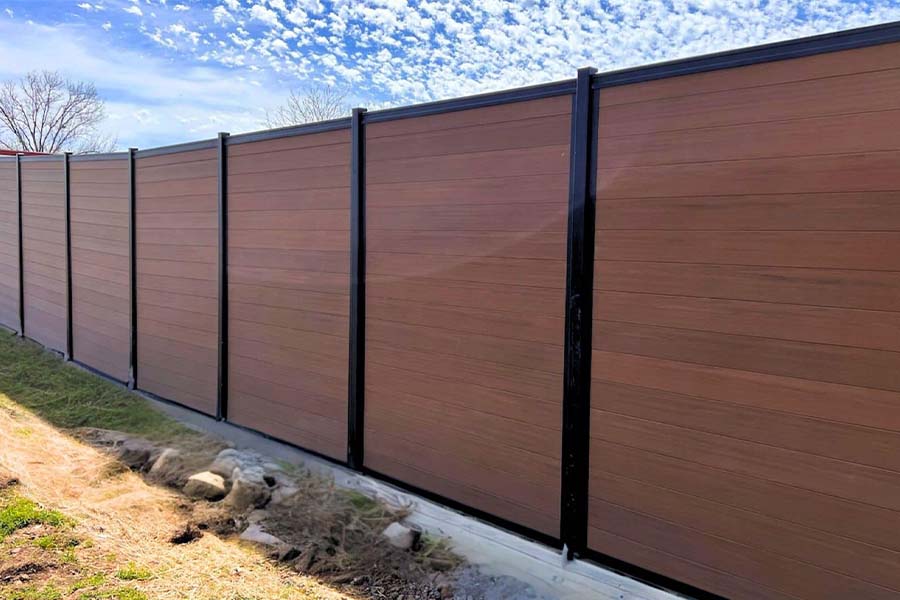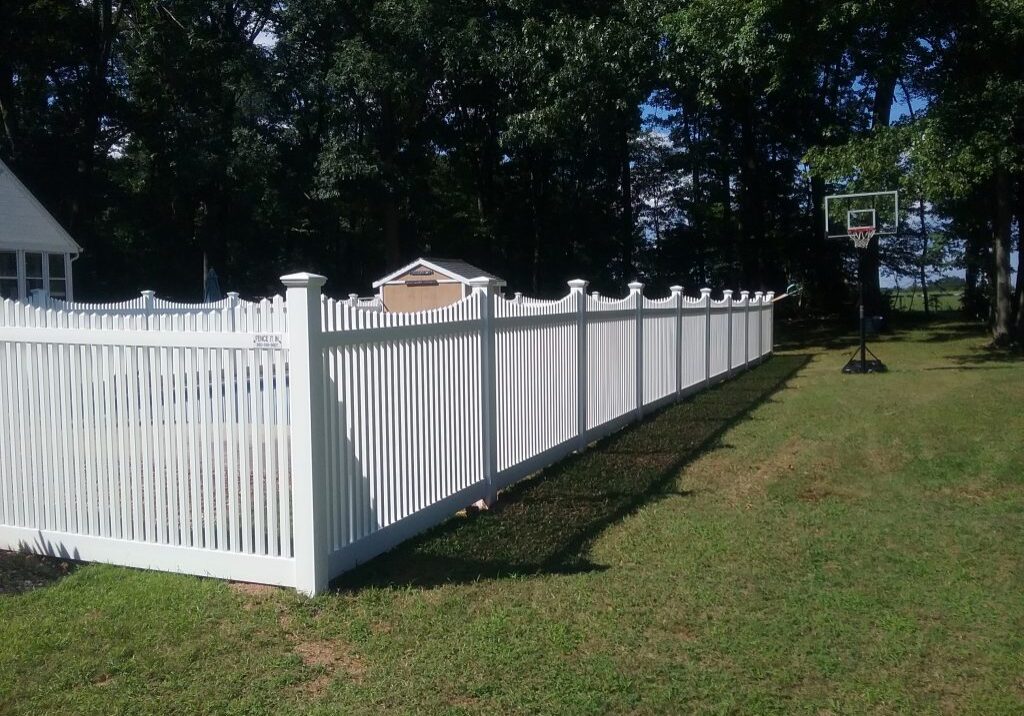All Categories
Featured
When it concerns safeguarding and beautifying your residential property, choosing the best secure fencing material is a critical choice. With a selection of choices available, picking the very best material for your needs calls for cautious consideration of elements such as safety, privacy, visual appeals, budget, and lasting maintenance. Whether you are installing a fence for your home or organization, each product has its very own collection of benefits and disadvantages. In this thorough guide, we'll explore the most prominent secure fencing materials to aid you make an enlightened selection.
Benefits:
Natural aesthetic. High personalization (discolorations, paints) Good privacy (when constructed tall) Relatively inexpensive. Disadvantages:
Requires normal maintenance (paint or discoloration) Prone to weather damage, insects, and rot. Much shorter lifespan compared to other products. Best For: Home owners seeking a warm, typical appearance with high modification capacity.
Benefits:
![]()
Low maintenance (no paint or discoloration) Immune to weather, rot, and parasites. Lasting (can last up to thirty years or even more) Range of designs and shades. Downsides:
Initial price can be greater than wood. Can fracture or break in severe weather (such as hefty influence) Limited modification (contrasted to wood) Best For: Organizations and home owners looking for a low-maintenance, durable, and lasting fencing solution.
Advantages:
Secure and extremely sturdy. Low maintenance (especially aluminum) Aesthetic allure (particularly functioned iron) Great for high-security areas. Disadvantages:
Can be expensive (especially wrought iron and steel) Not as private (unless incorporated with various other materials) Can corrosion (iron and steel require protective finishes) Best For: Home owners and services that need additional safety and security, or those looking for a premium, traditional design.
Benefits:
Very easy and affordable to set up. Low upkeep. Supplies safe borders. Ideal for large properties or pet rooms. Disadvantages:
Uses limited privacy and aesthetic appeal (unless combined with slats or covers) Can be seen as unpleasant in particular settings. Prone to corrosion if not treated. Best For: Large buildings, safety and security fencings, or areas where spending plan is a top priority over aesthetics.
Benefits:
![]()
Reduced upkeep (no staining or sealing called for) Immune to fading, rot, and insects. Durable and solid. Visual charm comparable to timber. Drawbacks:
Greater preliminary cost contrasted to wood. Restricted customization options (compared to natural wood) Can end up being fragile in extreme chilly temperature levels. Best For: Home owners who want the look of wood yet with an extra low-maintenance and resilient alternative.
Benefits:
Very durable and safe. Reduced maintenance. Deals premium privacy and soundproofing. Adds value to your property. Disadvantages:
High first expense. Labor-intensive installation. Limited style selection (more conventional designs) Best For: Premium homes or organizations requiring a resilient, protected, and trendy fencing.
Advantages:
Eco-friendly and eco friendly. Unique and visually pleasing. Easy and light-weight to set up. Can be used as an ornamental component. Negative Aspects:
![]()
Prone to weathering and damages with time (unless treated) Calls for routine upkeep to stop decomposing or splitting. Less secure than metal, wood, or stone. Best For: Eco-conscious home owners looking for a trendy and natural fence remedy.
Exactly How to Choose the Right Product. When choosing the ideal fencing material for your residential property, take into consideration the following aspects:
Budget plan: Some products like wood and chain web link are extra affordable, while others, like stone and functioned iron, are extra pricey. Upkeep: If you're trying to find a low-maintenance choice, plastic, steel, or composite products are excellent selections. Function: Take into consideration whether your key need is security, personal privacy, or aesthetics. For security, chain or metal web link fences might be best, while timber or vinyl could suit those looking for privacy. Visual Preferences: The product you pick ought to complement the design and style of your building. Timber provides a rustic appeal, while metal and stone provide an even more formal or contemporary look. Longevity: Some materials, like vinyl and steel, offer long-lasting longevity, while others, like timber, might need even more upkeep gradually. Verdict. Picking the appropriate fence product is an important choice that influences your property's safety and security, privacy, and visual appeal. With a variety of options available, from all-natural timber to low-maintenance vinyl and resilient steel, it is necessary to weigh each material's benefits and drawbacks based upon your certain needs and preferences. Whether you are trying to find a functional boundary or an attractive addition, this overview will help you make the best selection for your property.
- Timber Fencing. Wood fences are a classic and flexible choice that uses all-natural appeal and privacy. They can be found in numerous styles, including picket, personal privacy, and post-and-rail, making them adaptable to different building kinds and choices. Wood provides a conventional, rustic appeal, suitable for household setups, and is easy to personalize with paint or stains.
Benefits:
Natural aesthetic. High personalization (discolorations, paints) Good privacy (when constructed tall) Relatively inexpensive. Disadvantages:
Requires normal maintenance (paint or discoloration) Prone to weather damage, insects, and rot. Much shorter lifespan compared to other products. Best For: Home owners seeking a warm, typical appearance with high modification capacity.
- Plastic (PVC) Fencing. Vinyl fences are becoming increasingly popular as a result of their durability and reduced maintenance demands. Made from synthetic products, vinyl fencings are immune to weather, pests, and degeneration. They offer the appearance of wood however without the upkeep, making them a great option for both industrial and property residential or commercial properties.
Benefits:

Low maintenance (no paint or discoloration) Immune to weather, rot, and parasites. Lasting (can last up to thirty years or even more) Range of designs and shades. Downsides:
Initial price can be greater than wood. Can fracture or break in severe weather (such as hefty influence) Limited modification (contrasted to wood) Best For: Organizations and home owners looking for a low-maintenance, durable, and lasting fencing solution.
- Metal Secure Fencing (Aluminum, Steel, Wrought Iron) Steel fences are popular for their strength, security, and timeless sophistication. Light weight aluminum and wrought iron fences offer a sophisticated, high end appearance, often used for ornamental purposes, while steel fencings are selected for their durable security attributes.
Advantages:
Secure and extremely sturdy. Low maintenance (especially aluminum) Aesthetic allure (particularly functioned iron) Great for high-security areas. Disadvantages:
Can be expensive (especially wrought iron and steel) Not as private (unless incorporated with various other materials) Can corrosion (iron and steel require protective finishes) Best For: Home owners and services that need additional safety and security, or those looking for a premium, traditional design.
- Chain Link Secure Fencing. Chain link fencings are a cost-efficient and functional option, specifically for large properties or areas calling for basic, functional borders. They are widely used in both commercial and household settings and can be combined with privacy slats for added seclusion.
Benefits:
Very easy and affordable to set up. Low upkeep. Supplies safe borders. Ideal for large properties or pet rooms. Disadvantages:
Uses limited privacy and aesthetic appeal (unless combined with slats or covers) Can be seen as unpleasant in particular settings. Prone to corrosion if not treated. Best For: Large buildings, safety and security fencings, or areas where spending plan is a top priority over aesthetics.
- Compound Fencing. Compound fences incorporate wood fibers and plastic to develop a material that is both solid and reduced maintenance. They supply the appearance of timber with the durability of plastic and are offered in numerous shades and appearances.
Benefits:

Reduced upkeep (no staining or sealing called for) Immune to fading, rot, and insects. Durable and solid. Visual charm comparable to timber. Drawbacks:
Greater preliminary cost contrasted to wood. Restricted customization options (compared to natural wood) Can end up being fragile in extreme chilly temperature levels. Best For: Home owners who want the look of wood yet with an extra low-maintenance and resilient alternative.
- Stone and Brick Fencing. Rock and block fences are superb for those seeking optimum durability and a high-end aesthetic. These fences offer unmatched safety and security, privacy, and longevity, making them suitable for prominent properties or industrial structures that need a durable barrier.
Benefits:
Very durable and safe. Reduced maintenance. Deals premium privacy and soundproofing. Adds value to your property. Disadvantages:
High first expense. Labor-intensive installation. Limited style selection (more conventional designs) Best For: Premium homes or organizations requiring a resilient, protected, and trendy fencing.
- Bamboo Fence. Bamboo is a green alternative that gives a natural, rustic appearance while providing modest safety and security and personal privacy. It's becoming a favored for eco-conscious property owners who choose a more lasting material.
Advantages:
Eco-friendly and eco friendly. Unique and visually pleasing. Easy and light-weight to set up. Can be used as an ornamental component. Negative Aspects:

Prone to weathering and damages with time (unless treated) Calls for routine upkeep to stop decomposing or splitting. Less secure than metal, wood, or stone. Best For: Eco-conscious home owners looking for a trendy and natural fence remedy.
Exactly How to Choose the Right Product. When choosing the ideal fencing material for your residential property, take into consideration the following aspects:
Budget plan: Some products like wood and chain web link are extra affordable, while others, like stone and functioned iron, are extra pricey. Upkeep: If you're trying to find a low-maintenance choice, plastic, steel, or composite products are excellent selections. Function: Take into consideration whether your key need is security, personal privacy, or aesthetics. For security, chain or metal web link fences might be best, while timber or vinyl could suit those looking for privacy. Visual Preferences: The product you pick ought to complement the design and style of your building. Timber provides a rustic appeal, while metal and stone provide an even more formal or contemporary look. Longevity: Some materials, like vinyl and steel, offer long-lasting longevity, while others, like timber, might need even more upkeep gradually. Verdict. Picking the appropriate fence product is an important choice that influences your property's safety and security, privacy, and visual appeal. With a variety of options available, from all-natural timber to low-maintenance vinyl and resilient steel, it is necessary to weigh each material's benefits and drawbacks based upon your certain needs and preferences. Whether you are trying to find a functional boundary or an attractive addition, this overview will help you make the best selection for your property.
Latest Posts
Find Out Why Chicago Drivers Select Montclare Auto Repair for Reliable Service and Significant Savings
Published May 26, 25
1 min read
Uncover Premier Auto Repair Care offered by Montclare Auto Repair – Keep Your Car Running Smoothly
Published May 24, 25
1 min read
Discover Reduce Expenses on Car Maintenance with Montclare Auto Repair’s Limited-Time Deals
Published May 23, 25
1 min read
More
Latest Posts
Find Out Why Chicago Drivers Select Montclare Auto Repair for Reliable Service and Significant Savings
Published May 26, 25
1 min read
Uncover Premier Auto Repair Care offered by Montclare Auto Repair – Keep Your Car Running Smoothly
Published May 24, 25
1 min read
Discover Reduce Expenses on Car Maintenance with Montclare Auto Repair’s Limited-Time Deals
Published May 23, 25
1 min read